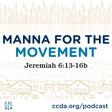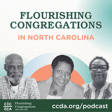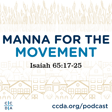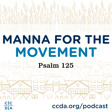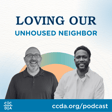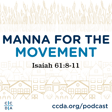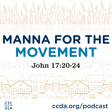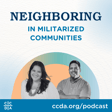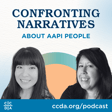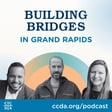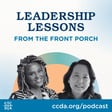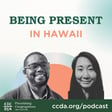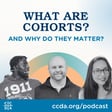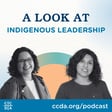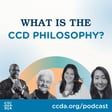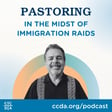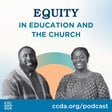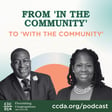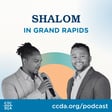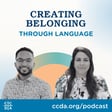Become a Creator today!Start creating today - Share your story with the world!
Start for free
00:00:00
00:00:01

Kingdom United: Exploring Multicultural Worship
2018 CCDA National Conference — Chicago Workshop
Kingdom United: Exploring Multicultural Worship — Chantel Varnado
Kingdom United is an interactive workshop that will explore the depth and dynamics of multicultural worship. Come learn how to develop practices that increase community engagement and empower marginalized people to have a voice and a sense of belonging.
Recommended
Transcript
Introduction and Background
00:00:04
Speaker
Welcome to the CCDA podcast.
00:00:06
Speaker
In this episode, Chantel Vernado teaches us about Kingdom United, exploring multicultural worship.
00:00:13
Speaker
Join her now for her workshop.
00:00:18
Speaker
I am Chantel Vernado, and I'm going to give you guys a little bit of information about me.
00:00:24
Speaker
And as you can see, I am a black girl, so I need a talk back church in here.
00:00:33
Speaker
All right.
00:00:34
Speaker
This will work better for me if y'all talk back to me.
00:00:40
Speaker
So just a little bit about who I am.
00:00:43
Speaker
I am a member of Grace and Peace Church.
00:00:47
Speaker
So you've seen several of my pastors speak this weekend.
00:00:52
Speaker
I am the worship arts director for Grace and Peace Church.
00:00:57
Speaker
I have been singing and, man, doing ministry for over 20 years now.
00:01:04
Speaker
I know you guys are probably going to think, how is that possible?
00:01:09
Speaker
Like, she's kind of got to be figuratively speaking because she looks very young.
00:01:16
Speaker
Let me just clue you into what happens in the black portion of the church.
00:01:21
Speaker
When you can speak, you then have a job.
00:01:26
Speaker
So I've been doing ministry since a very young age.
00:01:29
Speaker
Actually, I started church administration at the age of 12.
00:01:33
Speaker
Yeah, my grandfather was the pastor and he knew and saw gifting in me.
00:01:38
Speaker
And so I've been running church business for a very long time.
00:01:43
Speaker
And it ended up working because essentially my secular job ended up modeling my vocation in the church.
00:01:53
Speaker
I was an administrative, executive administrator to the chief of schools for Chicago Public Schools.
00:01:58
Speaker
We were in 40 Chicago Public Schools.
00:02:01
Speaker
So the church prepared me for what I was called to do for a season of my life.
00:02:09
Speaker
And now I get to do full-time ministry.
00:02:15
Speaker
Yeah, some of y'all who know what that means, you didn't clap.
00:02:23
Speaker
Because that means anything, right?
Transition to Larger Ministry
00:02:27
Speaker
Whatever they call you to do is what you do.
00:02:31
Speaker
And so my journey, let me give you a little bit about my journey to grace and peace.
00:02:37
Speaker
I was born and raised in a Pentecostal church.
00:02:40
Speaker
Anybody know what that is?
00:02:43
Speaker
Head clapping, foot stomping, tongue talking, right?
00:02:51
Speaker
Sanctify church.
00:02:54
Speaker
So all of what I have on now would be like against all of the sanctity of Jesus.
00:03:02
Speaker
Makeup is a no.
00:03:04
Speaker
Earrings are a no.
00:03:06
Speaker
Pants are definitely a no.
00:03:09
Speaker
But what I will say that I received from my upbringing was a reverence for the nature of who God is and being connected to him.
00:03:22
Speaker
So, born and raised in the Pentecostal church, been a part of the black portion of the church.
00:03:30
Speaker
And you'll hear my language just a little bit different because I believe we're one church.
00:03:37
Speaker
And we're just a segregated church.
00:03:41
Speaker
And so, y'all go.
00:03:46
Speaker
My husband just walked in the room and my pastora just walked in the room.
00:03:51
Speaker
So you guys can come on up.
00:03:52
Speaker
There's some seating up here.
00:03:55
Speaker
We didn't know y'all was going to come listen to me.
00:04:01
Speaker
So anyway, so having that background and being definitely deeply rooted in God, one thing that I can say about people of color in ministry, especially in the black and brown church, we are taught a deep reverence for listening and hearing what God wants you to do and just doing it like no matter the cost.
00:04:26
Speaker
And so my husband and I got married and my grandfather's rule of thumb was when you get married, you go to church where your husband go.
00:04:35
Speaker
We don't separate families.
00:04:38
Speaker
So I followed my husband to a ministry called New Life, which was a ministry of 20,000 people.
00:04:47
Speaker
And I was like, I'm used to this space where I like my grandfather was the pastor.
00:04:55
Speaker
So I'm used to being connected to leadership.
00:04:59
Speaker
And I could not visually see how I was going to function in this space.
00:05:06
Speaker
And so I kinda, I knew God had something for me there, but I didn't know what.
00:05:11
Speaker
So my husband and I were in marital counseling, and the pastors did marriage counseling, and they were over Spanish ministry.
Involvement with Spanish Ministry
00:05:26
Speaker
So we were in marital counseling one day and I am also a homebred local Chicago artist.
00:05:33
Speaker
So I sing.
00:05:36
Speaker
And we were getting ready to go do a concert in Kentucky or something like that.
00:05:42
Speaker
And my husband told the counselors.
00:05:45
Speaker
I was like, why did you tell them this?
00:05:48
Speaker
So here's the other thing that I am, you'll find out as we're talking, I am totally against Christian superstars.
00:05:58
Speaker
I'm against it.
00:05:59
Speaker
Because the head of the church is Jesus Christ.
00:06:03
Speaker
And any time we focus on anything else other than Jesus Christ, we've already bought into westernized culture.
00:06:13
Speaker
And so I do a lot of stuff and know a lot of people, but you'll never really hear me say it because I'm not the superstar.
00:06:22
Speaker
He is.
00:06:24
Speaker
So I was mad at my husband.
00:06:25
Speaker
I'm like, why are you telling them what I'm doing?
00:06:29
Speaker
And I didn't know that that was the first step for God to use, for God to open the door for Spanish ministry.
00:06:41
Speaker
So they were like, well, come by.
00:06:43
Speaker
We've been looking for a worship leader.
00:06:45
Speaker
Now in a place of 20,000 people where the worship team is at least 200 people, I'm wondering why you need a worship leader.
00:06:58
Speaker
Because everybody wanted to be a Christian superstar.
00:07:02
Speaker
So Spanish ministry wasn't the main stage.
00:07:06
Speaker
So nobody wanted to go and do a Spanish ministry.
00:07:10
Speaker
So we showed up and we got there to assess the space.
00:07:15
Speaker
You know how we do.
00:07:18
Speaker
And they're like, come up and sing.
00:07:21
Speaker
Now I'm used to this, because like I told you, I was born and raised Pentecostal.
00:07:27
Speaker
So you can go to any random visiting church, and if they know you sing, they're going to say, come up here and sing.
00:07:37
Speaker
So the Lord had already prepared me for this, so I was like, okay, what am I going to sing?
00:07:43
Speaker
And I'm struggling with what to do.
00:07:50
Speaker
call them because my brother here, associate pastor, we just did a lesson and he taught us that Latino is not really correct.
00:07:59
Speaker
So I'm trying to figure out what to call you guys.
00:08:03
Speaker
I mean, Latino is correct and Hispanic is not.
00:08:07
Speaker
But it is more of a Western name anyway.
00:08:10
Speaker
And so I'm like, Lord, I know you called me.
00:08:13
Speaker
I've always had a special affinity for my brothers and sisters.
00:08:17
Speaker
And so we began to minister.
00:08:19
Speaker
And they were like, listen, you have the job.
Worship Revival Experience
00:08:21
Speaker
Can you stay here?
00:08:22
Speaker
How can we get you on payroll?
00:08:24
Speaker
Rock on, rock on.
00:08:25
Speaker
We're there.
00:08:26
Speaker
We're there and we're learning.
00:08:28
Speaker
So this is where God has us planted in this large ministry.
00:08:31
Speaker
But we're like on the side.
00:08:34
Speaker
So, we're there and we're listening.
00:08:38
Speaker
And I am, just like I am in front of you all, I am like that with any random person on the street.
00:08:45
Speaker
So I went to the Gospel Fest.
00:08:47
Speaker
Anybody know what the Gospel Fest is?
00:08:50
Speaker
Okay, so the Gospel Fest is a huge festival that I happened to be protesting at the time because...
00:09:05
Speaker
Let me just, I'm going to go ahead and say it.
00:09:07
Speaker
They mess me up with these labels, these genre labels.
00:09:12
Speaker
So the gospel fest is supposed to be about the gospel of Jesus Christ, but there are no people there but black people represented on the stage, and I have a problem with that.
00:09:25
Speaker
And so I was actually fighting and my manager at the time was telling me, don't say that, don't say that, because you're an artist and you need people to buy your music.
00:09:34
Speaker
And I said, before I am an artist, I am his daughter.
00:09:39
Speaker
And so we were kind of fighting about that, but I met a lovely Hispanic couple there, and I had been preaching to on Facebook.
00:09:49
Speaker
You know, everybody's a Facebook preacher now.
00:09:51
Speaker
But I actually am a licensed and ordained evangelist, okay?
00:09:55
Speaker
So I was, like, giving these messages about revival and what God wanted to do with the church.
00:10:00
Speaker
And I was preaching about revival, and I meet this lovely Latino family.
00:10:08
Speaker
at the Gospel Fest and they're singing.
00:10:10
Speaker
Now you're a singer, when you hear singers, you're like, who is that?
00:10:15
Speaker
So I was like tapping my husband like, do you hear them behind us?
00:10:20
Speaker
Because what God had really been dealing with me about is that this next wave of revival, because people are so dry, so worn out, so weary, so tired of fighting, that it's going to come through his worshipers.
00:10:39
Speaker
And a lot of people don't understand that because they stick us as singers behind mics, and so they assume that we have no brain.
00:10:51
Speaker
And I tell people all the time, you say the preach word, we sing it.
00:10:59
Speaker
So, end up meeting this family, and they say, hey, we want you guys to come to this revival.
00:11:06
Speaker
And it was at Grace and Peace.
00:11:09
Speaker
And we get there and we were praying for the facility that we're now in.
00:11:15
Speaker
They had literally set up old school camp meeting tents outside.
00:11:21
Speaker
But we came together and the heart of it all was for worshipers and pastors across the city to really get together to revive the Lord's church.
00:11:33
Speaker
And you could tangibly feel the glory of God.
00:11:39
Speaker
That is something that is not always present in our circles.
00:11:45
Speaker
I can even venture to say that is something that is not even prioritized.
00:11:52
Speaker
We just want to sound good, look good, have a light show, smoke screens, and no real glory.
00:12:01
Speaker
So...
00:12:02
Speaker
I'm like, okay, and immediately I knew, I'm like, oh God, you're doing something.
00:12:10
Speaker
We begin to minister and I was like, I just, I love these guys.
00:12:15
Speaker
And my husband's like, yeah, I love him too.
00:12:18
Speaker
And we got a call from our senior pastor.
00:12:22
Speaker
We were just talking and the Lord was really not only pushing us into this idea of revival, but also understanding that the church can't be revived until it stops looking like a decapitated body.
00:12:41
Speaker
My hands on this side of town.
00:12:44
Speaker
There's no way people in our city should know what the gospel fest is.
Unity and Authenticity in Worship
00:12:51
Speaker
There is no way we should have radio stations like K-Love and 1390 that don't play each other's music.
00:13:03
Speaker
This idea of separatism is so blatantly pressed in our faces.
00:13:09
Speaker
And so ultimately we ended up going there because we believed that we were supposed to be ambassadors.
00:13:18
Speaker
And there's a whole layer of this conversation that's called the prophetic that we might not even get to that operates within myself and the pastor.
00:13:30
Speaker
And so he called us.
00:13:33
Speaker
We were just talking about being ambassadors.
00:13:35
Speaker
He calls us on the other line.
00:13:36
Speaker
Now, we weren't talking to him.
00:13:39
Speaker
He says, hey, I think you guys are supposed to be ambassadors.
00:13:43
Speaker
I was like, okay, we have to go here because the Lord was pressing us to step out of our comfort zone and be among people who don't look like us.
00:13:55
Speaker
Now, sometimes in our finite minds, it's like, well, you guys are still black and brown, but there's culture within culture.
00:14:05
Speaker
And we'll get to talking about that.
00:14:07
Speaker
So it's not what you're used to.
00:14:10
Speaker
And that's one of the things that I believe the Lord is coming for, our preference.
00:14:17
Speaker
It's not just prejudice, it's your preference.
00:14:19
Speaker
So you can be in a room with people who don't look like you, but because they don't sound like you, or you don't prefer what they look like, you don't receive from them.
00:14:31
Speaker
So...
00:14:33
Speaker
Rock on, rock on.
00:14:34
Speaker
We at Grace and Peace.
00:14:36
Speaker
Get there and I'm introduced to this thing called CCDA.
00:14:41
Speaker
Now I am, here's what I wanted to share with you guys.
00:14:47
Speaker
I am black and Irish.
00:14:53
Speaker
My grandmother, huh?
00:14:56
Speaker
Yeah.
00:14:58
Speaker
So my grandmother was a full real redhead.
00:15:04
Speaker
I'm not a real redhead.
00:15:09
Speaker
My father's mother was, they were Irish and I take full identity of who I am.
00:15:20
Speaker
full ownership of my identity because I believe it made me who I am.
00:15:25
Speaker
And so that's my, I guess my breakdown or whatever.
00:15:31
Speaker
And so I ended up here and I ended up coming to CCDA.
00:15:37
Speaker
Pastor Sandra invited me and I was like, what did I just walk into?
00:15:43
Speaker
And one of the things that disturbed me the most, there was a speaker that got up and he was just so mad.
00:15:56
Speaker
That's not funny, because some stuff makes us mad.
00:16:01
Speaker
But he was so angry and he was like, y'all want us to reconcile, but what y'all want us to reconcile to?
00:16:12
Speaker
And it messed me up because the people in the room were here for the same thing.
00:16:23
Speaker
And you can feel the angst over the room, right?
00:16:27
Speaker
So I went and I prayed and I'm like, Lord, what do you want us to reconcile to?
00:16:31
Speaker
Because see, I know you gave me a message of reconciliation and prophets often get crucified.
00:16:36
Speaker
So I know it's like coming at one point, but like, I don't want it to come too soon.
00:16:41
Speaker
So, so can you help me understand what are you asking me to share with your people?
00:16:48
Speaker
He said, I'm not asking you to reconcile to the systems of this world.
00:16:54
Speaker
They've already failed you.
00:16:57
Speaker
That's the problem.
00:16:58
Speaker
We keep trying to do reconciliation in a system that's broken.
00:17:03
Speaker
He said, I want you to call people to reconcile back to me.
00:17:11
Speaker
That is the heart of a worshiper.
00:17:15
Speaker
So I was like, okay.
00:17:17
Speaker
So that was an eye opener for me.
00:17:19
Speaker
And I came home and I called my husband and I said, man, I think God is really inviting us into something big.
00:17:29
Speaker
And I had a dream that I was going to create a multicultural hill song.
00:17:38
Speaker
Now,
00:17:41
Speaker
Those were the only words I had access to, okay?
00:17:45
Speaker
For my preference, right?
00:17:47
Speaker
For my purview for where I was.
00:17:50
Speaker
And I'm not talking about people with bodies that look different.
00:17:58
Speaker
I'm talking about creating a group of worshipers that were seriously going to be themselves in worship, in all of their identity, and profess and proclaim the gospel of Jesus Christ.
Multicultural vs. Multi-ethnic Spaces
00:18:14
Speaker
A collective of worshipers.
00:18:17
Speaker
And so I was like, okay, we can do this.
00:18:20
Speaker
We can do this.
00:18:20
Speaker
I have a little bit.
00:18:22
Speaker
The more I came around, the more I read, I had a little more language to put behind that.
00:18:29
Speaker
Hi, I'm Lorenzo.
00:18:30
Speaker
What I love about CCDA is being connected to so many amazing leaders across the country.
00:18:35
Speaker
Welcome to the CCDA podcast.
00:18:40
Speaker
Let's talk a little bit about these words.
00:18:42
Speaker
Let's talk about, according to Northern Baptist Cemetery, multi-ethnic refers to...
00:18:54
Speaker
I'm sorry, I said cemetery, didn't I?
00:18:56
Speaker
Well, you know, oh Lord.
00:18:58
Speaker
All right, all right.
00:19:01
Speaker
Refers to members of a variety of ethnic groups interacting with a particular forum, such as a multi-ethnic church.
00:19:10
Speaker
Such forums require a common structure or format with which all members agree to conform.
00:19:17
Speaker
I got a problem with this definition.
00:19:20
Speaker
in order for this multi-ethnic interaction to function successfully.
00:19:25
Speaker
You still think you're in a multicultural church?
00:19:30
Speaker
Reading this definition.
00:19:33
Speaker
Multicultural, on the other hand, is much more complex.
00:19:37
Speaker
It's harder to envision and fraught with conflict.
00:19:42
Speaker
The concept is that members of a variety of ethnic groups interact while maintaining their distinct cultural practices and priorities.
00:19:56
Speaker
We don't really have any multicultural spaces.
00:20:01
Speaker
We use the word because it sounds good.
00:20:05
Speaker
But we sit in multi-ethnic spaces.
00:20:09
Speaker
I often say, as I've been teaching on this and whatever the Lord gives me to say, that inclusion without validation breeds assimilation or absorption.
00:20:22
Speaker
So there's a major culture at the head of a thing.
00:20:28
Speaker
Oh, you want me to say it again?
00:20:29
Speaker
Okay.
00:20:30
Speaker
All right.
00:20:31
Speaker
Inclusion without validation breeds assimilation or absorption.
00:20:43
Speaker
Inclusion without validation.
00:20:46
Speaker
Now if you're gonna tweet it or put it up somewhere, give me my credit.
00:20:52
Speaker
I'm just so young.
00:20:54
Speaker
I am just so young with you.
00:20:56
Speaker
All right.
00:20:57
Speaker
So here it is.
00:20:59
Speaker
The reality is that many sit in a multi-ethnic space with those who are outside of the main culture feeling like visitors every week.
00:21:10
Speaker
and they're afraid to really be who they are.
00:21:16
Speaker
So in order for us to really produce an organic space, we really gotta embody Romans 12 and two.
00:21:29
Speaker
Don't be conformed to this world, but be transformed by the renewing of your mind.
00:21:37
Speaker
which means the way you functioned in a system before.
00:21:41
Speaker
Because a lot of us, whether we want to admit it or not, in our own spaces, in our own worlds, we have been inundated with westernized culture.
00:21:53
Speaker
So in Christ, you have to take on a new mind for this thing to even work.
00:22:04
Speaker
We're sitting in multi-ethnic spaces calling them multicultural.
00:22:09
Speaker
Now, go back to why I know now I was sent to grace and peace.
00:22:17
Speaker
Because we're sitting in a multicultural space trying to figure it out.
00:22:24
Speaker
Fraught with conflict on every hand.
00:22:28
Speaker
And you may hear some music that sounds like your genre of gospel, sounds like your genre of CCM, sounds like whatever the Lord releases is what we sing because we are more concerned with conveying his heart over our agendas.
00:22:51
Speaker
And so going into that space, I was a little nervous because as you all can see, I'm loud.
00:22:59
Speaker
And sometimes when I sing, I can get real loud.
00:23:04
Speaker
Because when you have people, oh, here's the other tidbit about me.
00:23:07
Speaker
So I am a natural born warrior, born and raised on the south side of Chicago from Englewood, okay?
00:23:13
Speaker
And so literally, when I see things happen in the church or outside of the church, I turn into a warrior.
00:23:23
Speaker
So I'm not singing, spirit break out.
00:23:29
Speaker
I'm singing, spirit break out, because I need you to break these walls.
00:23:36
Speaker
There's some aggression that comes with that, because I'm sitting in this space like this is my identity.
00:23:43
Speaker
So there's some things that arise in that space that are organic to who I am as a person that is not welcomed everywhere because it's not mainstream culture.
00:23:59
Speaker
And so people invite me without really inviting me.
00:24:07
Speaker
They invite me because of the color of my skin, but then I got to be concerned about how I show up.
00:24:15
Speaker
And it's not godly.
00:24:22
Speaker
Now, come on, y'all talking back to the church.
00:24:24
Speaker
Amen.
00:24:25
Speaker
Amen.
00:24:28
Speaker
So here it is.
00:24:30
Speaker
Let me see.
00:24:34
Speaker
Okay, so the hope is that churches and community will be able to clarify their own particular kingdom identity as they navigate the passage between multi-ethnic and multicultural that will result in a healthy and liberating expressions of the church of Jesus Christ.
00:24:58
Speaker
We have to be free to be who he authentically created us to be.
00:25:09
Speaker
So, developing cultural consciousness.
00:25:13
Speaker
We're gonna talk about this a little bit.
00:25:15
Speaker
It is an idea that the recognition or awareness on the part of an individual that he or she has a view of
Cultural Awareness and Microaggressions
00:25:25
Speaker
the world that is not universally shared or differs profoundly from that held by many members of different nations and ethnic groups.
00:25:35
Speaker
It includes an awareness of the diversity of ideas and practices found in human societies around the world and some recognition of how one's own thoughts and behaviors might be perceived by members of differing nations and ethnic groups.
00:25:52
Speaker
So I'm going to give you a couple of examples of what this looks like in the wrong way.
00:26:01
Speaker
I was in, I was at debate camp and I had braids in my hair.
00:26:06
Speaker
And you know you have those wonderful, we call them wonderful people.
00:26:11
Speaker
Our wonderful brothers and sisters came up to me and was like, oh, how did you get your hair like that?
00:26:20
Speaker
Like you're a project.
00:26:22
Speaker
Like you're always up for examination.
00:26:26
Speaker
Like it's something fun to do.
00:26:30
Speaker
I went to a, and one of our friends from, we just got a grant from this organization, and one of our friends is here, and I went there in Grand Rapids, Michigan.
00:26:45
Speaker
Love Grand Rapids, but y'all know y'all are red state.
00:26:49
Speaker
And not that it matters.
00:26:52
Speaker
Not that it matters, but a woman came up to me and was like, you're just such a pretty little black girl.
00:27:01
Speaker
I was like, it's going to take all of grace.
00:27:04
Speaker
I'm like, Lord, I told you, I can't be like Dr. Martin Luther King.
00:27:10
Speaker
Like, I could sound like him and say the stuff that he said, and, you know, I can continue in that vein, but I don't know if I'm going to be able to do this peaceably, because I told y'all I'm from Inglewood.
00:27:20
Speaker
So I was like, Lord, help me.
00:27:24
Speaker
But that is, so I had to collect myself.
00:27:28
Speaker
And I said, you look like a wonderful woman.
00:27:33
Speaker
And I'm just like, Lord, if you keep inviting me into these spaces, I don't know what I'm going to do.
00:27:41
Speaker
Because everything, especially for me, that you do or say is contingent upon how you look.
00:27:53
Speaker
So I was just telling even my pastor, my pastora, that I was, and this is not just with our wonderful brothers and sisters.
00:28:02
Speaker
This is like across cultures.
00:28:06
Speaker
I mean, Pentecostal, so I'm showing up with red hair?
00:28:09
Speaker
They're not finna listen to me.
00:28:12
Speaker
Right.
00:28:13
Speaker
I don't get the the the freedom to be who I want to be.
00:28:17
Speaker
And let me just throw this out here.
00:28:22
Speaker
Some of our examples are going to include different brothers and sisters.
00:28:27
Speaker
Let me tell you why.
00:28:29
Speaker
I'm going to say this for me.
00:28:32
Speaker
If and we're going to get to we're going to talk about matter of fact, let me just go there.
00:28:38
Speaker
So if we're developing cultural consciousness, one of the ways to really do that is actually develop relationship before you just start asking random questions.
00:28:53
Speaker
People don't care about how much you know until they know how much you care.
00:28:58
Speaker
All right?
00:29:01
Speaker
So who matters then?
00:29:05
Speaker
Who deserves a seat at the table?
00:29:09
Speaker
And don't just have me here for the sake of having my presence.
00:29:16
Speaker
But that is for everyone.
00:29:19
Speaker
Because I've seen on the opposite end of the spectrum, in places that are led by people of color, that our wonderful brothers and sisters are silenced when they walk into a space.
00:29:31
Speaker
They have no power and no authority.
00:29:33
Speaker
And that is further perpetuating the same westernized cycle that has been embedded in us.
00:29:41
Speaker
We're going to do to you what you've done to us.
00:29:47
Speaker
And they deserve a seat at the table too.
00:29:50
Speaker
It's just, they need to take a seat and let us lead.
00:29:59
Speaker
But if we don't include them, it's gotta be, one of the things I love about my church is that there's such a shared leadership model.
00:30:08
Speaker
And I've not seen this in many places.
00:30:12
Speaker
So it's got to be a shared space where all voices are really equal.
00:30:19
Speaker
And we're going to get to how we actually do this.
00:30:22
Speaker
Because the Lord told me to take you all through something today.
00:30:27
Speaker
So, everybody, everyone deserves a seat at the table.
00:30:32
Speaker
Why does everyone deserve a seat at the table?
00:30:34
Speaker
Because if we don't give everyone a seat at the table, we preach a lesser gospel.
00:30:40
Speaker
Jesus is not who he says he is.
00:30:43
Speaker
He didn't come for all if you're still excluding.
00:30:49
Speaker
So, but,
00:30:56
Speaker
I wanna talk about those who move into the margin.
Ethics of Story Appropriation
00:31:01
Speaker
Because here's the other thing.
00:31:04
Speaker
Some people come to places like CCDA, I told you I'm against Christian superstars, to create their own platform.
00:31:13
Speaker
So let me ask you a question then.
00:31:15
Speaker
If we're talking about who deserves a seat at the table, my next question to you is, what hurts more, being colonized by others or being colonized by your own?
00:31:30
Speaker
Because there are some people who look like us who have lived privileged lives, move into our communities, steal our stories, and then come and share them and get paid for it.
00:31:46
Speaker
And when you steal stories, you have just colonized and stolen our ability to overcome.
00:31:54
Speaker
You asking me how I hear some of y'all asking me, how is that possible?
00:31:58
Speaker
Because the scripture says when we talk about sharing stories, this is a different kind of language, culture within culture, right?
00:32:05
Speaker
We talk about testimony.
00:32:07
Speaker
That's what that is.
00:32:08
Speaker
And so the scripture says we overcome by the blood of the lamb and the word of our testimony.
00:32:14
Speaker
When you take my testimony and don't allow me to tell it, I can't overcome.
00:32:24
Speaker
You have stolen my testimony.
00:32:27
Speaker
And people are doing it unethically.
00:32:32
Speaker
So I'm very reserved when people come ask me, what's your story?
00:32:38
Speaker
I want to know what you want to do with it.
00:32:42
Speaker
Before I share it with you, are you really going to allow me to lead after I share it with you?
00:32:48
Speaker
Or are you going to take it, put it in a book, and stamp copyright on it?
00:32:57
Speaker
We're going to let that sit for a minute.
00:33:03
Speaker
Because one of the things that is a perpetuating ideology, and I heard somebody say it earlier, and it almost made my skin cringe, is because people get in circles like this and feel the need to cross over.
00:33:22
Speaker
But if we want family, what are we crossing over to?
00:33:27
Speaker
Why does our music need to cross over if it's saying the same thing?
00:33:35
Speaker
If we don't believe in each other, there's no way the world is going to hear from us.
00:33:44
Speaker
So because the beat and the track got a little more bass in it, the message changed.
00:33:52
Speaker
The message is still the gospel and good news of Jesus Christ.
00:33:58
Speaker
So the reason we came up with this whole Kingdom United thing was because we decided, even in our local church, where we do what we call warship, not worship, warship, that we were going to allow God to create new songs through us from an urban context that was going to share what was on his heart from our perspective to inform.
00:34:25
Speaker
Not just the people around us, but the larger church.
00:34:33
Speaker
So, all right.
00:34:36
Speaker
So here we go.
00:34:42
Speaker
Let me just go here.
00:34:43
Speaker
I'm going to skip this.
00:34:45
Speaker
I'll send it to you guys, okay?
00:34:46
Speaker
Okay.
00:34:49
Speaker
Let's talk about this this word right here Because I've heard it a lot and I actually just wrote an article on the truth about mutuality So you read this from my dr. Marlon King all this to simply say that all life is interrelated and
00:35:09
Speaker
We are caught in an inescapable network of mutuality, tied to a single garment of destiny.
00:35:16
Speaker
Whatever affects one directly affects all indirectly.
00:35:20
Speaker
As long as there's poverty in this world, no man can be totally rich even if he has a billion dollars.
00:35:27
Speaker
As long as there's diseases that are rampant and millions of people cannot expect to live more than 20 to 30 years, no man can be totally healthy.
00:35:37
Speaker
Even if he just got a clean bill of health from the finest clinic in America.
00:35:41
Speaker
Strangely enough, I can never be what I ought to be until you are what you ought to be.
00:35:50
Speaker
And you can never be what you ought to be until I am what I ought to be.
00:35:55
Speaker
Somebody's not being.
00:35:59
Speaker
And this is why we are attacking the church so greatly.
00:36:04
Speaker
The church is not doing what it's supposed to do because the church is not letting people be who they are.
00:36:12
Speaker
We all have something to bring to the table.
00:36:16
Speaker
We'll be right back.
00:36:17
Speaker
But first, a word from our sponsor.
00:36:19
Speaker
Hello, I'm Paul Miles, President and CEO of We Raise Foundation.
00:36:23
Speaker
We Raise invests in people and organizations that serve at the intersection of poverty, violence, and inequality.
00:36:30
Speaker
We start by acknowledging that change begins with we.
00:36:33
Speaker
We are in this together.
00:36:35
Speaker
And it's going to take our love and our compassion and dedication to solve the problems facing communities today.
00:36:42
Speaker
We invite you to be part of that with us and encourage you to visit WeRaise.org to find out how you can become involved and be a partner with WeRaise.
00:36:51
Speaker
I'm going to ask a really hard question.
00:36:55
Speaker
So the hard question is this.
00:36:58
Speaker
Has anyone in this room, you don't have to raise your hand, ever been molested or raped,
00:37:04
Speaker
or know somebody that has.
00:37:12
Speaker
Now, unless it has actually happened to you, I don't care how much you cry, how much you sit with me, you can never know how I feel.
00:37:27
Speaker
Ever.
00:37:29
Speaker
Because there are marks that that leaves
00:37:34
Speaker
that sometimes takes years to be erased.
00:37:40
Speaker
And what some people think the idea of mutuality is, is to just say, well, I come alongside you and I stand with you.
00:37:47
Speaker
It's not just that.
00:37:48
Speaker
Mutuality says, I can't be what I ought to be until you are what you are, what you ought to be.
00:37:54
Speaker
And so because you have the knowledge, then I'm going to give you the power.
00:38:01
Speaker
When people who have access to privilege and power give it away, then we're standing in real mutuality.
00:38:09
Speaker
Until that happens, we're still perpetuating the same cycles.
00:38:15
Speaker
So let's get rocking, because I want you all to be able to ask me whatever you want to ask me.
Spiritual Rehabilitation Steps
00:38:19
Speaker
So we're going to talk about how does this work and what does it look like.
00:38:23
Speaker
And I think we'll end here.
00:38:29
Speaker
No, we'll do the, we have an example that I want you all to do.
00:38:34
Speaker
So let's go through this real quick.
00:38:36
Speaker
How does this work and what does this look like?
00:38:39
Speaker
The Lord told me to take this specific group of people through something called essay.
00:38:46
Speaker
SA is called Spiritual Anonymous.
00:38:50
Speaker
It's like AA.
00:38:55
Speaker
See, we do the work of reconciliation, justice, and rehabilitation, but we get caught up at step one.
00:39:03
Speaker
We get caught up at admitting.
00:39:06
Speaker
We know how to point out the problem and say what's wrong, but we forget that there are 11 more steps.
00:39:15
Speaker
A lot of times, my pastor always says this, and he said it yesterday, that justice and reconciliation without Holy Spirit is just a bunch of angry folk.
00:39:29
Speaker
So then how do we get to this place where we include Holy Spirit in our rehabilitation?
00:39:37
Speaker
So first we have to admit that there's a problem that plagues us as a people group, period.
00:39:43
Speaker
Whether it's an ethnic group, a race, a religion.
00:39:46
Speaker
The second thing is we've got to believe that a higher power, in that case our higher power is God,
00:39:55
Speaker
even that a higher power would, I'm sorry, that a higher power can help us.
00:40:05
Speaker
Okay, I couldn't read my own writing.
00:40:07
Speaker
That a higher power could help us.
00:40:10
Speaker
See, one of the things that the Lord told me to tell the folks who do this work, because sometimes we sit in spaces that are really discouraging.
00:40:20
Speaker
And so there's a scripture that's in Proverbs 13 and 12 that says, hope deferred makes the heart sick.
00:40:29
Speaker
And some of us are sitting here sick because we haven't seen God move in the ways that we want him to, but we really haven't been including him in our justice.
00:40:40
Speaker
So we got to believe that God can help us.
00:40:46
Speaker
Then
00:40:50
Speaker
Three, we've got to decide to turn over control, and this is a hard spot, to God.
00:40:58
Speaker
You cannot do this work alone.
00:41:00
Speaker
You must be led by the Holy Spirit.
00:41:03
Speaker
But I'm convinced that people don't really want to be led by the Holy Spirit because it would destroy our personal agendas.
00:41:13
Speaker
Because the Holy Spirit would tell us to do something like this.
00:41:16
Speaker
Don't repay evil with evil.
00:41:20
Speaker
Don't get up there and be angry because anger only begets anger.
00:41:26
Speaker
So share my love because when love is shared, love is felt.
00:41:31
Speaker
And you can tell when the scripture says if you're not sharing love, you are like what?
00:41:36
Speaker
Sounding brass, symbols, just talking.
00:41:40
Speaker
And some people are talking about love, but all you're hearing is clinging of the symbols.
00:41:45
Speaker
You don't feel it.
00:41:49
Speaker
Number four, taking personal inventory.
00:41:54
Speaker
Uh-oh.
00:41:55
Speaker
Wait a minute.
00:41:56
Speaker
I could be wrong?
00:41:59
Speaker
All of these degrees, all of this seminary, wait a minute, I could be wrong?
00:42:07
Speaker
Sometimes, what did I say?
00:42:09
Speaker
Hope deferred makes the heart sick.
00:42:10
Speaker
You sit in this work, hmm,
00:42:14
Speaker
Let me read what I wrote and let's figure this out together.
00:42:18
Speaker
So what are my real motives?
00:42:21
Speaker
Do I do this work so I can have platforms at places like CCDA?
00:42:25
Speaker
So I can become a national voice and a Christian superstar?
00:42:29
Speaker
Or do I really believe that this work is holy and sacred?
00:42:33
Speaker
That this work is special and you've got to make sure you're doing it for the right reason.
00:42:40
Speaker
All ministry leaders have to always reassess your motives.
00:42:46
Speaker
I was praying one day and the Lord was just sharing with me his desires for me.
00:42:52
Speaker
And I was like, you know, we say this stuff, send me Lord, I'll go, I'll go.
00:42:56
Speaker
He says, okay, but if I send you, will you come back the same way that I sent you?
00:43:01
Speaker
Because sometimes we get out there and get access to platforms and the lights and the show and we get diverted from the original agenda.
00:43:11
Speaker
So, number five, admitting to God and another person the wrongs that have been done by you, not by others.
00:43:25
Speaker
This is a foreign word in the church, accountability.
00:43:31
Speaker
You don't always get it right.
00:43:34
Speaker
And I'm so, I'm probably going to pub my church like 15 million times because I believe God brought us there, but we really have some dope people.
00:43:42
Speaker
So I can go to my brother and be like, John, Eric, I am mad.
00:43:47
Speaker
I don't really like these Christian people today, and I'm no less saved.
00:43:53
Speaker
I don't need to have Prozac.
00:43:56
Speaker
I don't need the devil cast out of me.
00:43:59
Speaker
I'm just having a human moment.
00:44:03
Speaker
So we cannot call others to repentance if that's something we're not willing to do.
00:44:12
Speaker
Number six, be ready to have God correct some of your shortcomings in your character.
00:44:25
Speaker
See, I have this saying in my house.
00:44:29
Speaker
Don't fight so hard against something, trying not to become it, that you become the very thing that you're fighting against.
00:44:40
Speaker
Some of us sit in these spaces and because we see so much hatred and take in so much hatred and we're around so much hatred, we then digest it and become it.
00:44:52
Speaker
You are what you eat.
00:44:56
Speaker
How do you not become it though?
00:45:00
Speaker
Let me tell you, that was from the book of Chantel, 201.
00:45:06
Speaker
No, I'm kidding.
00:45:07
Speaker
So I had to lighten it up for a moment.
00:45:09
Speaker
Okay, so see, in these pulpits of righteous indignations, sometimes we fight so hard that we in our low finite minds begin to think that we are righteous.
00:45:22
Speaker
And forget that our righteousness on a good day is filthy rags.
00:45:27
Speaker
On a good day.
00:45:28
Speaker
That's why he had to come and become righteousness for us.
00:45:35
Speaker
So,
00:45:37
Speaker
Number seven, ask the Lord to remove these shortcomings.
00:45:43
Speaker
You know, if you ask him, he'll do it.
00:45:46
Speaker
Like he's not this just God of the Bible.
00:45:48
Speaker
That's a figment of our imagination.
00:45:50
Speaker
Like this is not like one of the best selling books and that that tells us all these fairy tale stories.
00:45:57
Speaker
The same power that existed in scripture still exists today.
00:46:02
Speaker
Number eight, make a list of wrong things that you've done to others and be willing to make amends.
00:46:15
Speaker
And apologize.
00:46:19
Speaker
I think I may have missed something.
00:46:21
Speaker
Number nine, continuing, I might be on the wrong number, y'all.
00:46:25
Speaker
Continuing to take personal inventory of your wrongdoings.
00:46:30
Speaker
This is a continual process.
00:46:33
Speaker
It's not like, okay, I repent today, I am done for all of eternity.
00:46:38
Speaker
I'm going to mess up again.
00:46:40
Speaker
We are human.
00:46:41
Speaker
We are not infallible, okay?
00:46:44
Speaker
Continual enlightenment is next.
00:46:47
Speaker
Connect with God through prayer and meditation.
00:46:53
Speaker
Now, let me help you right up and through here.
00:46:56
Speaker
The way that you've always done things may not work in this season.
00:47:03
Speaker
So sometimes silence and solitude is not going to get it.
00:47:08
Speaker
In a world where folks are loud and very verbose, sometimes you gotta cry out to the Lord.
00:47:16
Speaker
Come out of what feel, what did we talk about before?
00:47:19
Speaker
Preference.
00:47:20
Speaker
What feels naturally comfortable to you.
00:47:24
Speaker
Get out of yourself and out of your body and cry out to the Lord for change.
00:47:28
Speaker
Because what does scripture say?
00:47:30
Speaker
If my people who are called by my name would humble themselves and pray, then would I hear from heaven forgive their sins and heal their land.
00:47:42
Speaker
Some of us are sitting in solitude, not saying anything, not making a request so God in heaven has nothing to do.
00:47:51
Speaker
You're just sitting there.
00:47:53
Speaker
And you're comforting yourself in his presence and not speaking out what we need to happen in this world.
00:47:59
Speaker
We are God's conduits for what he needs to take place in this world.
00:48:05
Speaker
We are the hands and feet of Jesus.
00:48:09
Speaker
Then once you do all that, you're going to carry this message abroad.
00:48:15
Speaker
All right.
00:48:16
Speaker
So let's stop there.
00:48:19
Speaker
Thank you for listening to the CCDA podcast.
00:48:21
Speaker
And thank you to Chantel Vernado for her expertise on Kingdom United, exploring multicultural worship.
00:48:28
Speaker
Hello, I'm Paul Miles, president and CEO of We Raise Foundation.
00:48:33
Speaker
We Raise invests in people and organizations that serve at the intersection of poverty, violence, and inequality.
00:48:39
Speaker
We start by acknowledging that change begins with we.
00:48:42
Speaker
We are in this together.
00:48:44
Speaker
And it's going to take our love and our compassion and dedication to solve the problems facing communities today.
00:48:51
Speaker
We invite you to be part of that with us and encourage you to visit WeRaise.org to find out how you can become involved and be a partner with WeRaise.
00:49:02
Speaker
Thank you for listening to the CCDA podcast.
00:49:05
Speaker
Don't forget to subscribe on Apple Podcasts, Spotify, or wherever you listen to podcasts.
00:49:10
Speaker
This podcast is produced by Dan Portnoy in association with Scott Overpeck.
